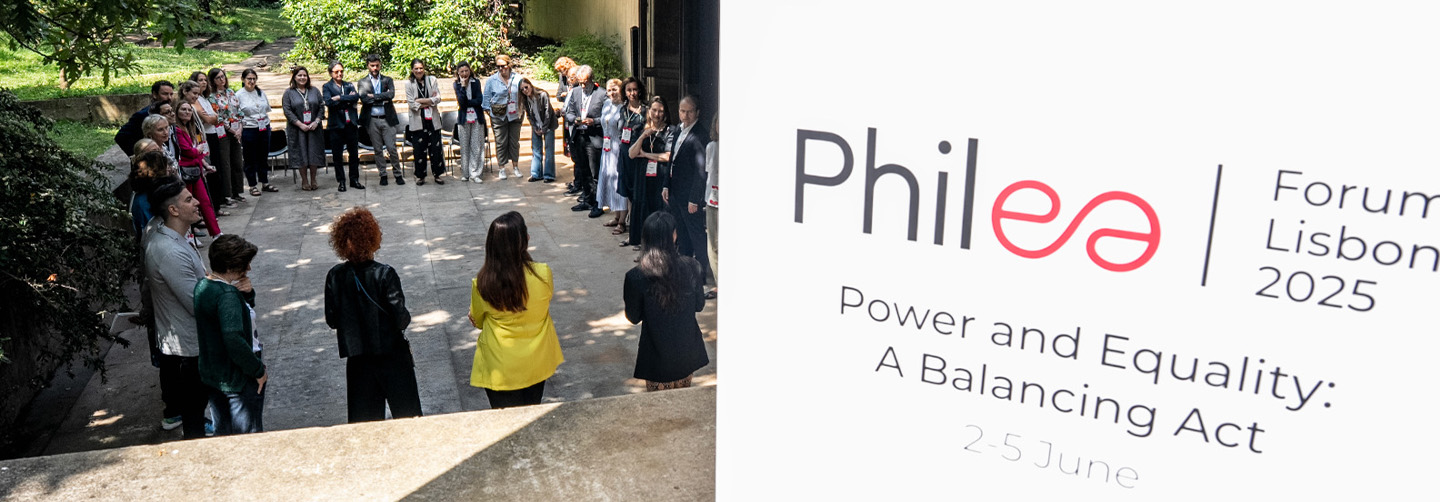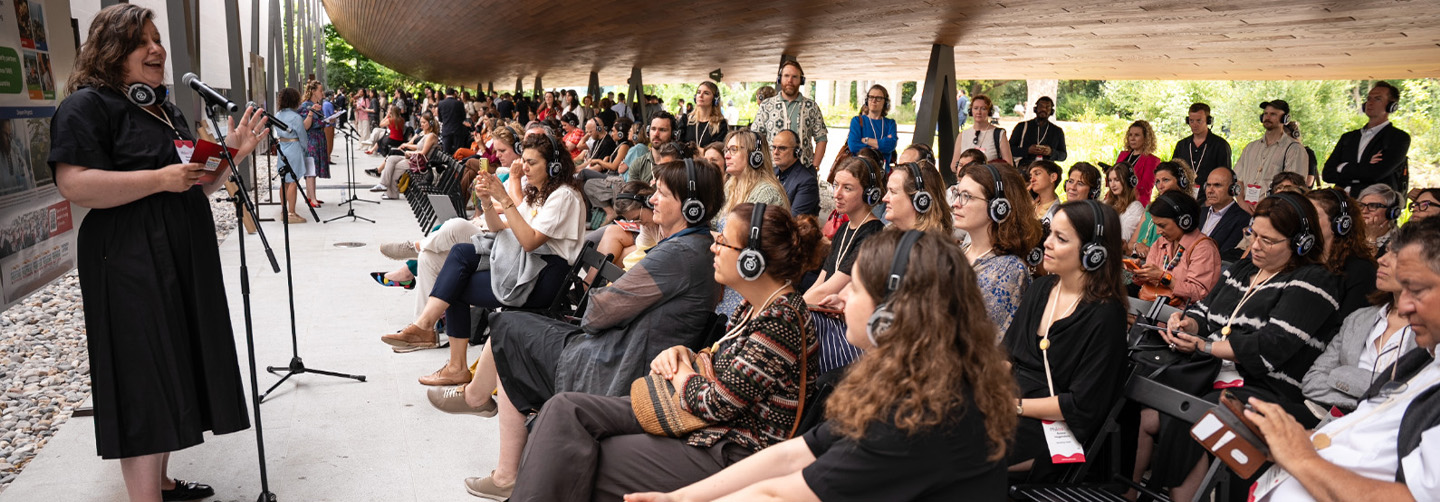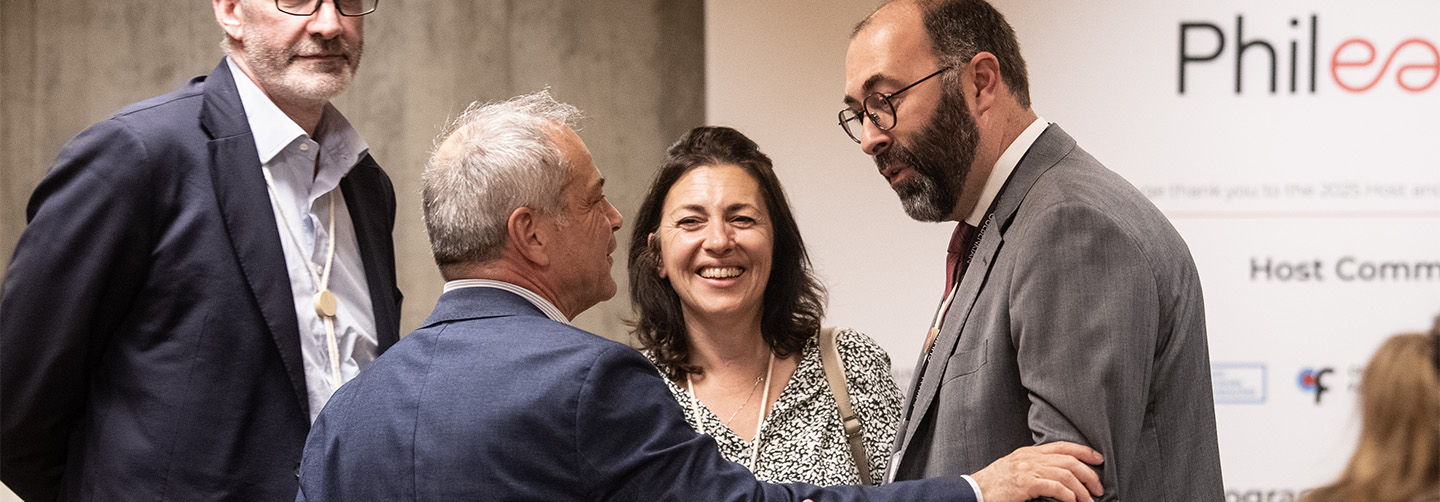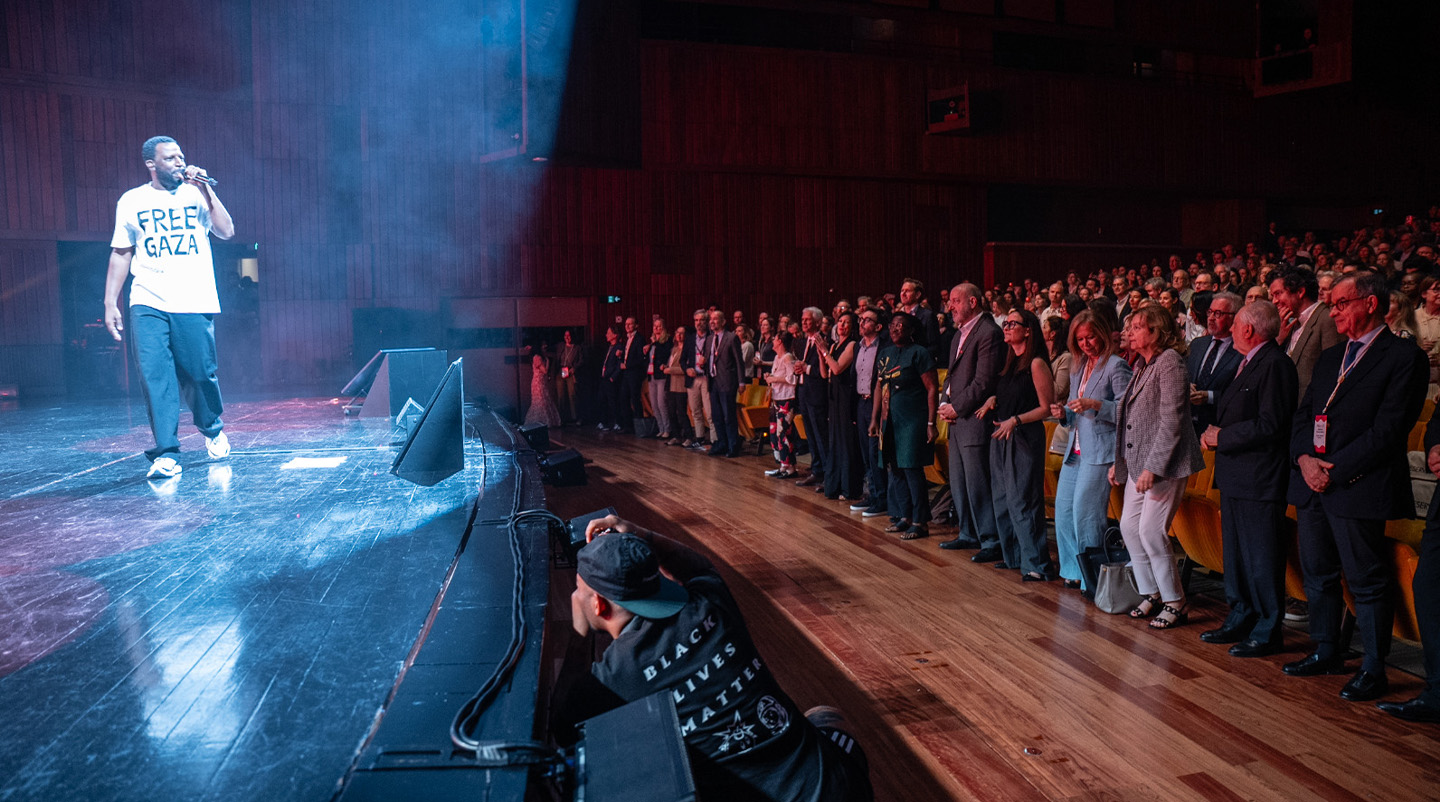Philea Forum 2025
Grappling with the theme of “Power and Equality: A Balancing Act”, more than 800 participants from Europe and around the world convened from 2-5 June in Lisbon for the Philea Forum 2025, hosted by the Calouste Gulbenkian Foundation.
Recent global events have amplified awareness of systemic inequalities and historical injustices. These incidents have sparked a societal reckoning with racial, social and economic justice, placing philanthropic organisations themselves under scrutiny for their role in perpetuating or challenging existing power imbalances. A clear line has since been drawn connecting widening inequality and power imbalances to rising polarisation and challenges to democracy.
Inequality has far-reaching consequences that extend well beyond individual hardship. Countries with high levels of inequality are more prone to financial crises and slower economic recovery. Inequality doesn’t just hurt the poor; it destabilises economies, undermines confidence, contributes to democratic backsliding, and leaves everyone more vulnerable, from small business owners to corporate executives.
The Philea Forum 2025 addressed these critical issues, exploring the intersection of inequalities, power imbalances and structures which are sustaining them (including within philanthropy) and the ways in which we can help create the more equitable and just society we want and need.
Setting the scene: Equality and philanthropy
“Inevitably, wherever you find imbalance in the world around us, be it in a figurative or literal sense, then the result is that something bends, breaks or fractures, sometimes beyond repair. It is therefore better to avoid such a fracture in the first place, and that means righting imbalances before it is too late. We pursue equality, and greater balance, because as philanthropy organisations we aim to build and create, not break and discard.”
With these words, Angel Font, President of Philea and Associate General Director of Research and Fellowships at “la Caixa” Foundation, kicked off the Opening Plenary of the Forum where speakers set the stage for the discussions during the conference.
Delphine Moralis, Chief Executive of Philea, spoke of the potential for uncomfortable conversations at the Forum, saying this is “…probably a sign that we’re doing it right… It’s okay for it to be hard, and it’s better to be uncomfortable trying than to stand on the sidelines while others stumble… At Philea, we are proud to see how many organisations in our membership are already engaging with questions of equality, power, justice and inclusion. Through our networks and communities, members come together for sharing and learning. Beyond just being spaces for conversations, they are increasingly seen as opportunities to do better.”
Read Delphine Moralis’s full speech
The following keynote speakers laid out their views on philanthropy and equality: Antonio M. Feijo, Calouste Gulbenkian Foundation; Marija Jakovljević, Dalan Fund; Larry Kramer, London School of Economics and Political Science; Bruno Maçães, former Portuguese Secretary of State for European Affairs, Writer; and Françoise Moudouthe, African Women’s Development Fund, Eyala Platform, and Malala Foundation.
Speakers shared the following key themes:
- When it comes to philanthropy taking the risk of sharing power, we must understand that there is risk in maintaining the status quo as well.
- Philanthropy is only transformative if it commits to transforming itself, and now is the time for philanthropy to do this so that it can, in turn, transform the world. But if it’s time to re-strategise, that doesn’t mean it’s time to freeze. Foundations have enough resources to do both: to transform as they continue to act. In these times, delays are deadly.
- “Half a loaf is better than none.” Some in philanthropy act as if no loaf is actually better than a half, sticking to old strategies and paradigms, even if they no longer work.
- When the goal is justice, you must centre those who are best placed to make justice happen, i.e. those with lived experience who have been through these fights many times before.
- Philanthropy may say it wants justice and equality, but this is not cheap. Real resources must be put behind these efforts.
- Turning inequality into a zero-sum game only increases opposition to what we are trying to do.
- Power doesn’t just exist in the abstract. Ideas matter. If you really want to change how people act, by far the best way to do it is to change how they think.
- Civil society institutions and universities are now under unrelenting political pressure in the US and in Europe: The legitimacy of foundations will be equally questioned in the not-too-distant future. We should be able to counter such moves.
A highlight of the Opening session was a powerful musical performance by Portugal’s Dino D’Santiago, founder of Mundu Nôbu and an activist and singer who weaves stories of inclusion, multiculturalism, empowerment and identity into his vibrant, genre blending music.
Opening Plenary recordings

Trying to get the balance right: From broad themes to practical pathways
Through a range of sessions, breakouts, debates and site visits during the Forum, participants were challenged to move beyond surface-level reflection and create space for honest, sometimes difficult conversations, and embrace discomfort as a necessary part of confronting the entrenched power structures within and beyond philanthropy.
The discussion kicked off on the Members Day with an interactive session dedicated to the just-released Philea publication “Philanthropy and Equality: A Framework for Sharing Power and Addressing Inequalities”. The framework invites philanthropic organisations at different stages of this journey to explore four key areas of practice: internal practices, relational approaches, redistribution of capital, and systems thinking. Each area is “illustrated” with multiple real-life examples of how foundations are translating theory into practice when it comes to equality. The framework is meant to inform, inspire and encourage conversations and action well beyond the Forum.
Over the course of the conference, participants engaged in conversations that ranged in focus from high-level themes to concrete methods of putting equality into practice.
The Forum offered a space to explore the larger themes of inequality, including:
- The systemic nature of inequality, how it threads through every area philanthropy works in.
- The importance of recognising the intersectional nature of inequality, where multiple types of interconnected inequalities reinforce each other.
- How the legacy of colonialism infuses many facets of inequality – from racism to increasing socio-economic disparities.
- In these tense times with autocracy on the rise, how economic inequality is a key driver of democratic backsliding.
Participants debated how these themes interact with philanthropy’s practices and mindsets, including:
- How it is not enough to simply address the theme of equality in what philanthropy funds, but that it is essential to apply an equity lens to operations as well, including governance and decision-making practices.
- The critical importance of power sharing to make needed change.
- The need to shift mindsets in philanthropy to see the communities it serves as essential experts to inform and participate in decision-making.
- The importance of acknowledging that while change within a foundation is not easy, progress must be made anyway.
- The need to hold space for unpredictability.
- Balancing the urgency for change with the realities of foundation practice and parameters.
Participants dived into the nuts and bolts, exploring the many entry points for this work by sharing and learning from each other around:
- Concrete steps for moving toward participatory grantmaking – such as using the grant application process to let applicants set the agenda, or engaging in participatory research processes.
- How to adapt due diligence processes to build more trust-based models of grantmaking.
- Ways to incorporate those with lived experience in decision-making processes, and tied to that, how to know who best represents the communities philanthropy is trying to serve.
- How part of sharing power is moving capital to those most in need by, among other ways, building assets for partners.
- Ways to shift from prescriptive, project-based grantmaking to longer-term, unrestricted funding.
- How to spot inequities in grants management processes.
- Methods to test grants and programmes against equality metrics.
- How impact investing and mission-related investments can be leveraged to counter inequality.
- How to use data to support – rather than determine – the critical conversations that are needed.
- Finding ways to cope with the inherent difficulties of taking traditional project funding and regranting it as open, flexible funding.

Going forward
The conference wrapped up with panel discussions and a keynote speech on takeaways from the Forum.
Charles Keidan, Executive Editor of Alliance Magazine, moderated a panel of “Harvesters” who shared their insights from the conference: Virginia Carcedo, Fundacion ONCE; Sidra Raslan, Creative Leadership Youth Programme, CAUX – Initiatives of Change; and Liisa Suvikumpu, Association of Finnish Foundations.
Delphine Moralis, Chief Executive of Philea, moderated a panel of philanthropy leaders who gave their views on the Forum and how philanthropy can use what was learned to move forward: Asid Afridi, Barrow Cadbury Trust; Antonio M. Feijo, Calouste Gulbenkian Foundation; Mall Hellam, Open Estonia Foundation; and Adama Sanneh, Moleskine Foundation.
Panellists shared the following key points:
- We need to transform discomfort into action.
- We must be able to listen, to understand the part we are playing in a much larger symphony.
- Philanthropy is not an end in itself, but rather a means for doing something useful, for going where we are most needed.
- Our approach should not only be about solutions but about the flexibility to adapt to the questions of current times.
- Change starts from within. Philanthropic organisations need to understand how their senses of identity and the beliefs they hold may be keeping them from making the difference they want to make.
- We talk about failures and the dire times we are living in, but there is a lot of hope in philanthropy.
- Philanthropy needs to remain resilient and develop strategies to strengthen and defend civil society, democracy and open society values. And it must be brave.
- We must open up philanthropic governance structures: That’s where the decisions are made.
- It’s important to recognise the difference between diversity and real inclusion: Diversity means you are invited to the event, inclusion means you are invited to dance.
- We must recognise the potential to challenge the companies that we as philanthropy invest in.
- It’s critical to share best practice on how to use our power responsibly.
Wrapping up the plenary, Matthias Scheffelmeier, ChangemakerXchange & The Possibilists, described incredible changemakers around globe – young entrepreneurs, advocates, activists and builders of local start-up scenes working at the ground level on LGBTQ+ rights, restoration of coral reefs, food programmes for Africa, banning single-use plastics, and fighting oppression. He emphasised that these people are the ones fighting, and sometimes dying, so who is philanthropy – with all its privilege, reach, resources and access – to give in to despair? Now is not the time “to blame complexity for our complacency”.
He went on to offer the following on what philanthropy should do:
- “Be a megaphone for those without one, because they show us every day that this dominant, collective current narrative of a world where things are too late and cannot be fixed anymore is, in fact a lie, and instead they write the story of a planet that can heal and that can recover, and of a world that’s kinder, more caring, and more human… So turn your LinkedIn feeds, your websites, and your social media channels into windows for their solutions.”
- Consider unrestricting grants.
- Consider trust building with organisations you support, and then give money to their purpose, not their projects.
- Consider at least spending down part of your endowment, “which is locked up in some ETF while the world is burning and fascists keep entering our parliaments.”
- Consider cutting in half the time it takes for you to decide on your grants, and then cut it in half again and again. These solutions cannot wait.
- Get out of the way: Follow these organisations and serve them.
Philea Forum 2025 highlights video
Plenary speakers & performers
Thanks to all of the plenary speakers and performers who brought their insights, inspiration and talent to the Forum:
- Asid Afridi, Chief Executive, Barrow Cadbury Trust
- Virginia Carcedo, Secretary General, Fundacion ONCE
- Antonio M. Feijo, President of the Board of Trustees, Calouste Gulbenkian Foundation
- Angel Font, President, Philea; Associate General Director of Research and Fellowships, “la Caixa” Foundation
- Mall Hellam, Executive Director, Open Estonia Foundation
- Marija Jakovljević, Participatory Resource Distribution Manager, Dalan Fund
- Charles Keidan, Executive Editor, Alliance Magazine
- Larry Kramer, President & Vice Chancellor, London School of Economics and Political Science
- Bruno Maçães, former Portuguese Secretary of State for European Affairs, Writer
- Françoise Moudouthe, CEO, African Women’s Development Fund; Founder of the Eyala Platform; and Member of the Board of the Malala Foundation
- Sidra Raslam, Co-Founder, Creative Leadership Youth Programme, CAUX – Initiatives of Change
- Adama Sanneh, Co-Founder and CEO, Moleskine Foundation
- Dino D’Santiago, Artist and Founder of Mundu Nôbu
- Matthias Scheffelmeier, Co-Founder and Managing Director, ChangemakerXchange & The Possibilists
- Liisa Suvikumpu, CEO, Association of Finnish Foundations
We also thank the many session speakers and moderators who gave their time, energy and expertise during the Forum.

Host and Programme Committees
We would like to extend our sincere gratitude to the Forum 2025 Host and Programme Committees for all of their hard work, dedication and incredible support. The Forum simply could not happen without the commitment of these organisations.
And a very special thanks goes to the Calouste Gulbenkian Foundation, which provided the venue for the Forum at its premises in Lisbon. Not only did the foundation open up its physical space for the event, the Gulbenkian team also gave tremendous amounts of time and energy in the run-up to the conference, and provided flawless support during the Forum itself.
Host Committee
- Calouste Gulbenkian Foundation
- Champalimaud Foundation
- Francisco Manuel Dos Santos Foundation
- Fundação Oriente
- Luso-American Development Foundation
- Portuguese Foundation Centre – CPF
Programme Committee
- Calouste Gulbenkian Foundation
- Charles Stewart Mott Foundation
- Essl Foundation “Zero Project”
- Fondazione Monte dei Paschi di Siena
- Laudes Foundation
- Paul Hamlyn Foundation
- Philea – Philanthropy Europe Association
- Portuguese Foundation Centre – CPF
- Rockefeller Brothers Fund

Contact



